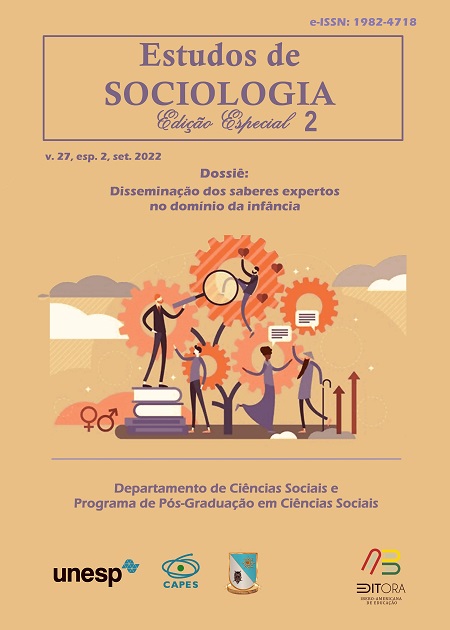The orthophrenic institute of doctor Voisin and the education of the so called “out of the ordinary line” children in France during the July monarchy (1830-1848)
DOI:
https://doi.org/10.52780/res.v27iesp.2.16832Keywords:
Phrenology, Multispecies Health, Alienism, 'Abnormal’ childrenAbstract
This article examines how a first medical-pedagogical experiment was set up under the July Monarchy, to manage children considered as being “out of the ordinary line”. This experiment sought both to adapt their education to their particularities and to prevent, in doing so, the formation of potential criminals or alienated. This experimentation was set up by the alienist Félix Voisin in his “orthophrenic institute”. We show both what were the principles, inspired by phrenology, which guided this experimentation; what were the medical-pedagogical techniques implemented in this institute; and more specifically how these experimentations paved the way to a first thematization of the so called “abnormal” children and of what will become the so called “conduct disorders” of the difficult child.
Downloads
References
ANNALES d’hygiène publique et de médecine légale. Paris: Baillière, 1835. v. XIII.
CHAPPEY, J.-L. Sauvagerie et civilisation. Une histoire politique de Victor de l’Aveyron. Paris: Fayard, 2017.
CROMMELINCK, C. Rapport sur les hospices d’aliénés d’Angleterre, de la France et de l’Allemagne. Courtrai: Jaspin, 1842.
DORON, C. O. Races et dégénérescence. L’émergence des savoirs sur l’homme anormal. 2011. Thèse (Doctorat) – Université Paris VII, 2011.
DORON, C. O. Félix Voisin and the Genesis of Abnormals. History of Psychiatry, v. 26, n. 4, p. 387-403, 2015.
DORON, C. O. Perversão ou perversidade? Genealogia de um debate médico-jurídico. Saúde e Sociedade, v. 27, p. 311-325, 2018.
DUPRAT, C. Le temps des philanthropes. Paris: CHTS, 1993.
FOUCAULT, M. Les anormaux. Cours au Collège de France (1974-1975). Gallimard, EHESS/Seuil, 1999.
FOY, F. Manuel d’hygiène. Paris: Baillière, 1845.
GALL, F. J.; SPURZHEIM, G. Anatomie et physiologie du système nerveux. Paris: Schoell, 1812. t. II.
GAZETTE des écoles. Hygiène. Etablissement orthophrénique. 22 maio1834.
GOLDSTEIN, J. Console and classify. Univ. of Chicago Press, 1989.
GUIGNARD, L. Juger la folie. Paris: PUF, 2010.
INSERM (dir.). Trouble des conduites chez l´enfant et l´adolescent. Rapport. Paris: Les éditions Inserm, 2005. v. XIV. 428 p. (Expertise collective). Disponível em: http://hdl.handle.net/10608/140. Acesso em: 10 jan. 2021.
JOURNAL BELGE des connaissances utiles. Fondation d’un établissement orthophrénique, p. 202-204, jul. 1834.
JOURNAL des débats, 27 fev. 1835.
LACHAPELLE, S. Educating idiots: utopian ideal and practical organization regarding idiocy inside XIXth Century French asylums. Science in context, v. 20, n. 4, p. 627-648, 2007.
LUC, J. N. L’invention du jeune enfant au XIXe siècle. Paris: Belin, 1997.
MARC, C. C. H. Rapport fait à M. le conseiller d’Etat, préfet de police, sur l’établissement orthophrénique de MM. Félix Voisin et P. Cheneau. Moniteur Universel, n. 297, 24 out. 1834.
PAUL-BONCOUR, G. Pratique de la gymnastique orthophrénique dans la cure de l’instabilité psycho-motrice. Revue de psychiatrie, v. 15, 1911.
PÉLICIER, Y.; THUILLIER, G. Un pionnier de la psychiatrie de l’enfant. Edouard Seguin (1812-1880). In: Comité d’histoire de la securitésociale. Paris, 1996.
QUINCY-LEFEBVRE, P. Une histoire de l’enfance difficile (1880-1930). Paris: Economica,1997.
RENNEVILLE, M. Le langage des crânes. Paris: Les Empêcheurs de penser en rond, 2000.
RENNEVILLE, M. Crime et folie. Paris: Fayard, 2003.
RUSH, B. Medical enquiries and observations upon the diseases of the mind. Philadelphia: Kimber& Richardson, 1812.
TAYLAN, F. Mésopolitique. Paris: Ed. de la Sorbonne, 2018.
VIAL, M. Les enfants anormaux à l’école. Aux origines de l’éducation spécialisée. Paris: Armand Colin, 1999.
VOISIN, F. A. Applications de la physiologie du cerveau à l’étude des enfants qui nécessitent une éducation spéciale. Examen de cette question: quel mode d’éducation faut-il adopter pour les enfants qui sortent de la ligne ordinaire et qui, par leurs particularités natives ou acquises, forment communément la pépinière des aliénés, des grands hommes, des grands scélérats et des infracteurs vulgaires de nos lois? Paris: Everad, 1830.
VOISIN, F. A. Applications de la physiologie du cerveau à l’étude des enfants qui nécessitent une éducation spéciale. Journal de la Société Phrénologique de Paris, 1832. t. I.
VOISIN, F. A. De l’homme animal. Paris: Béchet Jeune & Labé, 1839.
VOISIN, F. A. De l’idiotie. Paris: Baillière, 1843a.
VOISIN, F. A. Classification des idiots. Annales médico-psychologiques. Masson, Paris, p.327, 1843b. t. I.
VOISIN, F. A. Orthophrénie. Un nouveau système d’éducation. In: VOISIN, F. A. Analyse de l’entendement humain. Paris: Baillière, 1858.
Published
How to Cite
Issue
Section
License

À revista Estudos de Sociologia ficam reservados os direitos autorais pertinentes a todos os artigos nela publicados.
Os artigos publicados e as referências citadas na revista Estudos de Sociologia são de inteira responsabilidade de seus autores.
A Estudos de Socilogia utiliza a licença https://creativecommons.org/licenses/by/4.0/ (CC BY), que permite o compartilhamento do artigo com o reconhecimento da autoria.



